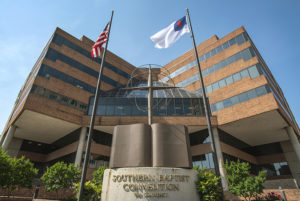By Randy C. Davis
President and executive director, Tennessee Baptist Mission Board
 Let’s make one thing clear from the outset: There is absolutely no denominational hierarchy when it comes to the Southern Baptist Convention.
Let’s make one thing clear from the outset: There is absolutely no denominational hierarchy when it comes to the Southern Baptist Convention.
Seldom does my Clarity column address matters involving SBC or Tennessee Baptist Convention entities or institutions, and never in a negative manner. However, this column is birthed out of a significant burden I have regarding an issue too important to bypass. Bear with me; I’ll get to the issue in a moment.
First, some context. There are two important bedrock values Southern Baptists hold dearly and historically: Biblical confession and voluntary cooperation. These were shaped by a unity gathered around the basic tenets of faith as expressed in the Baptist Faith and Message. Together we embrace non-negotiable doctrines like the exclusivity and sufficiency of Jesus Christ as Savior and Lord; biblical inerrancy and sufficiency of the Bible; substitutionary death of Jesus on the cross for the atonement of our sins; and the literal, physical resurrection of Christ from the grave.
These are a few of the essentials. We provide a broad tent on non-essentials.
While we are most definitely a confessional people, we are also a cooperative people. We “join together” to maximize economy, efficiency, and effectiveness for shared goals of Kingdom importance. We voluntarily pool financial and human resources to advance Great Commission work. Cooperation is the genius of our great SBC/TBC network of churches across this state and across the country that enables us to do missions, compassion ministry and Christian education on a global scale.
And leading this charge is your local church. At the epicenter – the headquarters – of the SBC, TBC, associations and partner ministries is your church. Don’t rush past that statement. Let its weight land on you because I take that statement very seriously. All SBC and TBC institutions, agencies and entities, in one way or another, are to serve the local church. Never the other way around. There is categorically no SBC denominational hierarchy, and if there were, your church would be at the top of our relational system.
I emphasize this point because of a recent amicus brief signed and submitted by the SBC Ethics and Religious Liberty Commission (ERLC) related to the legal case of Will McRaney v. NAMB. An amicus brief is a “friend of the court” statement submitted by a party or an organization interested in the argument of a case in which that party or organization – in this case the ERLC – is not one of the litigants. In the amicus brief, the ERLC included language, namely the use of “hierarchy,” that misstates and misrepresents the historic non-connectionism, autonomous polity of Baptists, and incorrectly describes the hierarchal relationship between SBC entities and churches. It’s only one word, but destructive to our understanding of how we relate to one another and has significant future legal implications.
Consider this. Your churches send messengers to our conventions, SBC and TBC. Those messengers elect trustees for SBC and TBC entities. Those trustees represent the interests of churches in relation to those institutions, guiding those institutions to act in accordance with the collective wishes of churches. Churches do not act in accordance with the wishes of institutions. That is why board trustee engagement in the policies and procedures of all our entities is so vitally important. It is not an honorary appointment that garners a participation certificate. Trusteeship is a legal responsibility of serious importance.
We even codify this structure in Article IV of the SBC Constitution to prevent a denominational hierarchy: “While independent and sovereign in its own sphere, the Convention does not claim and will never attempt to exercise any authority over any other Baptist body, whether church, auxiliary organization, associations or conventions.”
If we allow drift from this benchmark polity, the damage will be extremely significant and invite grave consequences.
That is why the ERLC’s use of the word “hierarchy” in the amicus brief is profound and must be changed. I have spoken with ERLC leaders and they genuinely regret the implication of the amicus brief they filed at the 5th U.S. Circuit Court of Appeals. Their explanation is that there was a very small window of opportunity to submit the brief. In other words, it was rushed. A legal brief representing Southern Baptists via the ERLC, using language in violation of our own governing documents and historic understanding of the autonomy of the local church, was filed before the 5th U.S. Circuit Court of Appeals without careful vetting or consideration of the legal precedent it might establish.
My hope is that the ERLC would take immediate action to rectify this egregious error.
I am sharing this information with you for two reasons. One, I want you to know that as a former pastor and forever church member, I take very seriously the preeminence and autonomy of the local church at the center of our denominational ecosystem.
Two, I frequently hammer home to your TBMB staff that we were created by Tennessee Baptist churches and that our mission and core values are squarely rooted in serving Tennessee Baptist churches. In fact, our existence is summed up in three words: We Serve Churches. Churches do not serve us. We have deep respect for your church’s priority position under the Lordship of Jesus Christ. Your voluntary cooperation together to accomplish the Lord’s work is deeply appreciated and is never taken for granted.
There is no denominational hierarchy and it’s important that we cooperate to ensure there never will be.
It is a joy to be with you on this journey. B&R

